![]()
This was the message from Duncan Stewart to the Organic College community recently last where he addressed students on their annual Awards evening.
Arriving early on Friday, Mr Stewart, who has pioneered environmental television programmes in Ireland and abroad for over twenty year, first visited the Cooperative Creamery Museum. Noting the historical significance of the cooperative heritage and the vision of a community to cleverly pool its resources and uplift the local economy in 1889, this was he said a message which deserves to be shared in the Ireland of 2014.
Later speaking to students and graduates of Organic Food Production, Mr Stewart outlined how the current spending on imported food and imported energy were two major opportunities for communities to tackle. In this process he said we can generate serious stable local employment, as well as improving our diet and securing energy supply for the future.
Climate change, he reminded us was real and the serious forecasts were for further temperature rises of up to four degrees, making last month’s floods and winds a regular occurrence, unless serious corrective measures were taken. Our carbon emissions were he said amongst the worst in Europe and climate education, was a must for the agenda of education at all levels. Oil prices, while stable at present, were only going to rise further and our position of being ninety percent dependent, at the end of a gas pipeline was a most unstable position to be in, particularly in an unstable world.
Spending over six billion euros annually on imported oil and gas, when alternatives were an option he regarded as a no brainer. The town of Dromcollogher by its layout and tradition of caring for its people was ideally placed for a district heating system which would heat the entire town at a fraction of the present cost and generate considerable local employment in the process.
To the young graduates of the College he said, “You are our hope for the future. Your commitment to stay, to work and grow top quality food in Ireland must be matched by support from the community and from the state agencies charged with development”.
Our food imports annually are unnecessarily high at over eighty per cent of what we consume and this represents a drain of nearly two billion euros annually out of our community and our country. Real cooperatives which are community based could reverse this trend and create valuable local employment. The new cooperative movement which was being reformed was the ideal vehicle to assist farmers and growers to take back control of the food production and distribution chain and revitalise communities in the process.
Mr Thomas O Connor, acting Chairperson of the Irish Organic Farmers and Growers Association, and a past graduate of the college congratulated the learners and asked the question, what is an organic farmer?
Quoting Vandana Shiva (Indian Scientist, Philosopher Environmental Author) “An Organic farmer is the best scientist of today, because they actually have to understand how nature works in order to produce. They are the best health specialists of today, because they are giving us the food that gives us health. An organic farmer is the best steward of the land and the best ecologist. And I am increasingly feeling that they are the best peacemakers of today because there is more violence, more death, more destruction, and more wars through a violent industrial agriculture system. And to shift away from that into agriculture of peace is what organic farming is doing.”
He urged the graduates to engage in growing and as soon as possible to get Certified Organic. It is he said a guarantee to our customers that your food does not contain herbicides, insecticides, pesticides or antibiotic. That you farm in an environmentally sound way, leaving the land better than you got it. It is the most political thing you can do.
Dr Sinead Neiland of the College also congratulated the graduates on their studies, but also on their enterprises in developing field scale vegetable production, in their innovation by adding value and new taste combinations to food by way of chutneys and preserves. These were, she said, essential skills for a community which would help growers increase their range of produce and their potential income.
Organic consultant and teacher at the college Ms Mary Lynch presented special Awards to TUS participants and said partnerships with other state agencies such as West limerick Resources and Teagasc were essential and beneficial to all involved.
Mr Sean Burke Chief Executive of Limerick and Clare Education and Training Board urged the graduates to continue on the learning path, as rural development depended especially on skilled, educated, aware and committed people with a cooperative vision.
The Awards were presented to over fifty graduates including several who had studied by Distance Learning at FETAC/QQI Levels 5 and 6. Ms Paula Pender a master grower, graduate of the college and coordinator of Distance Learning Programme, welcomed graduates from Sligo, Wexford, Dublin, Cork, Kilkenny and those involved in work for Trochaire in Uganda.
This course in Organic Horticulture, she said, allowed people from all around the country to study at home and come to Dromcollogher at weekends for practical work. Many of these graduates she said were now growing in their own communities and her plan was to expand this course from Level 5 to level 6 and Diploma standard.
The Organic College is currently enrolling students for the next cycle of courses which begin in September. Places are limited and early application is advised by visiting the website www.organiccollege.com or by phone at 06383604.
The pics were taken by Kate Lynch a friend of the college. Some photos of our Graduation night.
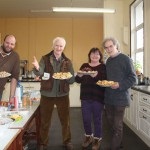
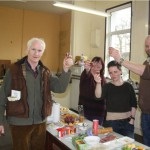
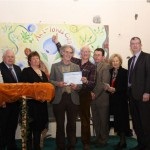
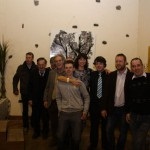
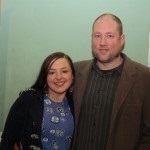
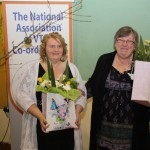
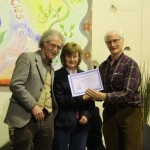
Source: The Organic College – Dromcollogher The Model Town for Resilient Ireland





